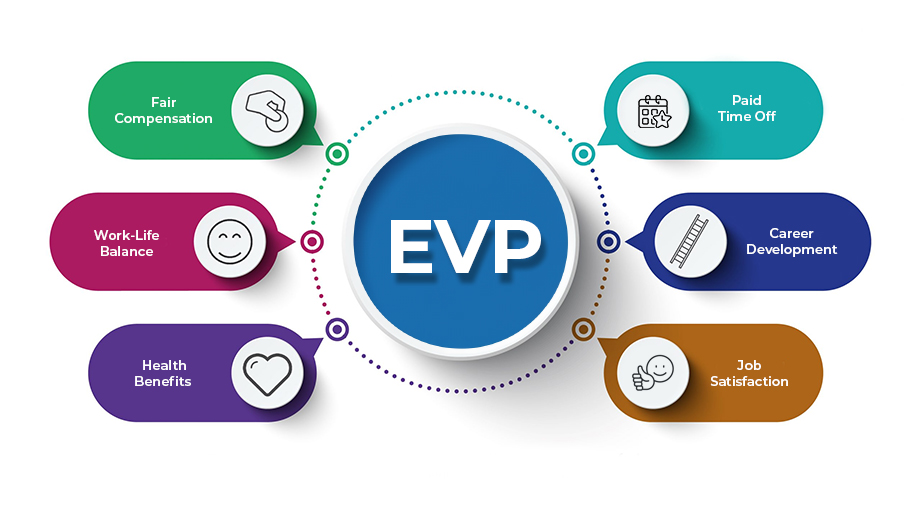Impact of Employee Value Proposition (EVP) in Modern Organizations
Ever wondered “What makes employees stick with a company for a long term?”
The response usually highlights aspects like work-life balance, competitive compensation, ESI benefits, paid time off, job satisfaction, and opportunities for growth. These elements collectively constitute what we refer to as the EVP. Organizations that effectively deliver on their EVP can decrease annual employee turnover by 69%. Let’s explore in detail what is EVP and why is it important for organizations.
What is EVP?
Employee Value Proposition (EVP) is a unique set of benefits and values that an employer offers to its employees in return for their skills, capabilities, and experiences. It goes beyond salary to include:

Fair Compensation:
Providing pay that appropriately reflects employee’s skills and contributions.
Work-Life Balance:
Offering policies and practices that support a healthy integration of work and personal life.
Health Benefits:
Including comprehensive coverage like ESI to ensure employee’s well-being.
Paid Time Off:
Allowing sufficient time for rest, relaxation, and personal pursuits.
Job Satisfaction:
Creating a fulfilling work environment where employees feel valued and motivated.
Career Development:
Offering opportunities for growth, skill enhancement, and advancement within the organization.
Significance of EVP:
Attraction and Retention:
Strong Employee Value Proposition attracts top talent and retains experienced employees who contribute effectively to the organization’s success. The cost of employee turnover can be up to 213% of the employee’s salary, making retention a key financial priority.
Employee engagement:
Successful EVP aligns employee’s personal goals with the company’s values and mission, making them feel valued and understood. An engaged workforce is more productive and determined, increasing the ROI that the company obtains from its workforce. Gallup research shows that productivity among highly engaged teams is 14% higher than that of teams with the lowest engagement.
Branding:
A powerful Employee Value Proposition attracts the right talents for your organization and also creates a positive impact on your customers. 29% of consumers consider how well a company treats its employees when deciding whether to become loyal customers.
Financial Impact:
A well-defined EVP can result in a 50% reduction in hiring costs. And it boosts productivity through enhanced employee engagement and lowers recruitment costs by strengthening the employer brand. Additionally, a compelling EVP reduces absenteeism and workplace disputes, leading to further financial savings.
Conclusion:
EVP is more than a set of benefits—it’s a strategic tool that defines how an organization values and supports its employees. Companies that invest in their EVP are twice as likely to report profit growth, highlighting the significant financial benefits of prioritizing employee value and satisfaction. By prioritizing a powerful EVP, companies not only attract and retain talent but also cultivate a workplace where individuals can grow professionally and personally. Ultimately, a robust EVP contributes to long-term organizational success.
Together let’s create a sustainable workforce. Contact us @ ambconline.com.












